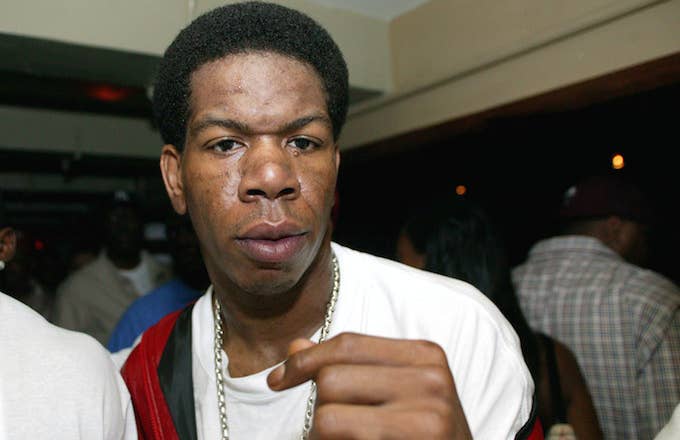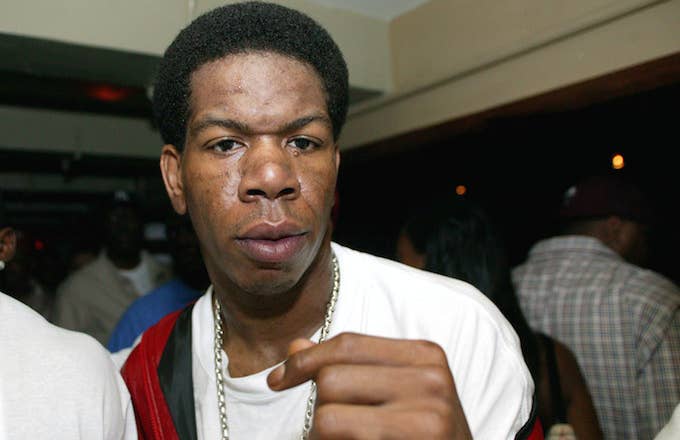
Beginnings are tricky things to nail down. But no matter how you define it, Craig Mack was there from the beginning.
Born in 1970, Mack’s childhood coincided with the earliest days of hip-hop. By the time he was 12, he was following in the footsteps of LL Cool J and Run-D.M.C. He was at park jams during the inception of the Long Island rap scene, a pre-teen battling other kids, including a young Erick Sermon. In a recent interview, Sermon recalled winning a circa-1982 battle mostly because he had access to a DJ, while Craig simply brought along a beatboxer.
Mack was at the forefront of hip-hop’s Golden Age, releasing a song the same year pretty much every iconic rap album of the era came out. 1988’s “Just Rhymin/Get Retarded”—released under his initial name, MC EZ, when he was just 17—didn’t blow up the charts, but it made a huge impact on his emerging local scene, soon to explode with iconic groups like De La Soul (who at that point were just releasing their first, tentative singles) and Leaders of the New School.
Rest in Peace CRAIG MACK. Long Island's own. We were proud of Craig when he came out with the little indie song as MC EZ & TROUP. Then a few years later he went on to make one of the biggest most iconic songs in Hip Hop history. Rest EZ. Never forgotten. We love ya bro
And, after six years of shopping his demo nonstop, he was there at the beginning of Diddy’s Bad Boy empire, one of the shaping forces in rap’s rise from local artform to world domination. "There's not a label who has not seen or heard of me in their offices," Mack told the New York Times of his long path to Bad Boy, in a 1995 interview. Sean Combs signed Mack after hearing him freestyle, and not long after the two were off to the races. In fact, Combs himself credited Mack with being “the first artist to release music on Bad Boy.” Mack appeared on a remix of Mary J. Blige’s “You Don’t Have to Worry” in 1993. “Remixed by SEAN ‘PUFFY’ COMBS FOR BAD BOY ENTERTAINMENT,” read the all-caps credits.
The song featured a Craig Mack far removed from his days as MC EZ. Gone were the 1980s cadences and standard boasts of being a “smooth talker.” Instead, there was an energetic, wild, occasionally hard-to-comprehend rhymer with offbeat brags of being a “funk robotic, super-sick psychotic MC who got it.”
“We tired of hearing...every MC talking about his sad story and stuff like that,” Mack told Rap City in Toronto in 1994. “We bringing entertainment. We bringing the enjoyment, bringing the funk. We bring it somewhere different.”
Then came “Flava in Ya Ear.” The song, released in July 1994, addresses some criticisms of his earlier appearance. “Yo Mack,” says a voice at the record’s beginning. “I don’t even understand how they didn’t understand you on that Mary joint. Kick that old robotic, futuristic, George Jetson crazy joint.”
And kick it he did, Jetsons references and all. Over an instantly iconic beat by Easy Mo Bee (who also lent Biggie plenty of heat for Ready to Die), Mack mixed his years of battle-tested rapping with his new funk robotics, all with an energy reminiscent of his Long Island neighbor, Uniondale’s Busta Rhymes.
The song had it all: the the oddest science boasts this side of Kool Keith (“I got the data/To turn your body into anti-matter”). The fast runs that came thisclose to falling off-beat, before landing safely. The self-conscious use of ad-libs (“Boy, I flip ‘boy’ all the time”). Of course, the shout-out to the new label (“Now I’m a Bad Boy/Watch the MCs I destroy”). Finally, just in case you had any doubts who was behind all of it, he was of course there to remind you—in third person, no less. “And if you didn’t know who’s rhyming/I guess I’m gonna say ‘Craig Mack’ with perfecting timing.”
The success of “Flava” paved the way for Bad Boy’s dominance. In fact, there likely wouldn’t even be a Bad Boy without “Flava.” Diddy got fired from Uptown Records, even after making Mary J. a star, for his brash ways. He wanted to make Bad Boy a real label, and finally got a meeting with record mogul Clive Davis. And the song that convinced Davis to give Bad Boy an eight-figure distribution deal? You guessed it: “Flava in Ya Ear.” The song’s catchiness let Davis know that Diddy had what it took to conquer the radio.
And Clive was right. The song reached number 9 on the Billboard Hot 100 chart and was nominated for a Grammy. Reflecting on Mack’s passing, Diddy remarked on Tuesday that “Flava” was “our first hit.” “You believed in me and you believed in Bad Boy,” he wrote. “I will never forget what you did for hip-hop.”
Then, there was its now-classic remix, which featured LL Cool J, Busta, Rampage, and a new Bad Boy artist, The Notorious B.I.G. Big’s short but iconic appearance is still instantly quotable (His “Don’t be mad—UPS is hiring” line became famous enough that it spawned a memorable comedy skit by ItsTheReal years later), and the song served as Big’s introduction to many listeners.
Big and Mack were Puff’s cornerstone artists in the label’s early days. Diddy even set up an appropriately-named “B.I.G. Mack” promo run, complete with a fast food-themed marketing campaign.
The partnership didn’t last long. Big was frequently derisive about his labelmate, saying that his career-making appearance on the “Flava” remix was only done “for political reasons,” and he was lukewarm when giving his opinion about Mack’s abilities. Biggie’s debut album, released just a week before Mack’s, was hailed as a near-classic upon its release, receiving four-and-a-half out of five mics from the outlet that was then hip-hop’s Bible, The Source. While Mack’s debut album Project: Funk da World showcased his self-proclaimed “unorthodox rhyme style” to great effect—scoring him another hit single with “Get Down,” and a gold record to boot—it did not have either the critical love or cultural impact of the competing release from Bad Boy’s new star.
Mack never released another album on the label. His 1997 follow-up Operation: Get Down, despite being executive produced by Eric B., failed to make a dent on the charts. And then, silence, barring the occasional foray back into the headlines. He didn’t even take part in his former label’s huge 2016 reunion tour.
But lately it seemed like the former Bad Boy was finding his artistic footing again. He put out The Mack World Sessions in 2017, and Erick Sermon was reportedly working with his childhood rhyme foe and former go-fer on new music.
I'm devastated over the news of Craig Mack.. We just finishing up his new album.. smh.. Rest in Power Craig...
Easy Mo Bee himself also said that he had recently sent his pal some music.
We won’t find out what a 2018 version of Craig Mack reunited with his still-active peers would have sounded like. But even more tragic is that yet another important cultural figure is gone far too soon at just 47. In just the past two and a half years or so, hip-hop has lost Sean Price (43), Reggie “Combat Jack” Ossé (53), Prodigy (42), Lovebug Starski (57), Pam “The Funkstress” Warren (51), and many others. Hip-hop, and thus American culture, is missing some very important voices who could have helped a generation negotiate its way through adulthood, showing people how to mature and change without selling out or giving up.
The kid from Long Island who engaged in rhyme battles with only a beatboxer to back him up might have been one of those voices—we’ll never know. But we’ll always have his robotic, futuristic style to remember him by.




